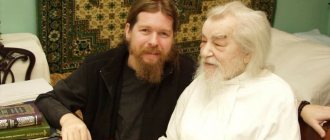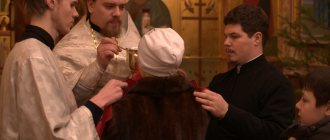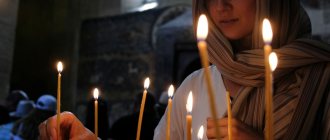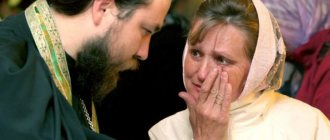Archimandrite John (Krestyankin’s) book “The Experience of Constructing a Confession” is widely known among Orthodox believers. Suffering people from all over the country came to the elder for spiritual advice. Although he objected when they called him that, he said: “There are no elders now.”
After the death of the priest, his books remained - spiritual beacons pointing the right path.
John Krestyankin as the author of the book
Archimandrite John was the confessor of the Pskov-Pechersky Monastery for almost forty years. His life was not calm. He experienced himself what persecution for faith is. But the priest always remained kind to people and thanked God for everything.
Biography
The future church minister was born on April 11, 1910 in the city of Orel. His parents, Mikhail Dmitrievich and Elisaveta Ilarionovna, belonged to the bourgeois class. The boy was named in honor of St. John the Hermit, whose celebration took place that day. In total, eight children were born in the family. Ivan was the youngest child.
Already as a child, the boy served in the church. Ivan was a sexton for Archbishop Seraphim, who was later canonized. After graduating from high school, he enrolls in accounting courses. Then he begins to work in his acquired specialty in Orel.
But frequent work on weekends and in the evenings prevents him from participating in religious services. He quits and moves to Moscow, where he gets a job as an accountant. The new work schedule no longer interfered with church attendance.
Church service
On January 14, 1945, Metropolitan Nikolai (Yarushevich) Ivan Mikhailovich was ordained to the rank of deacon.
On October 25 of the same year, Patriarch Alexy I ordained him to the priesthood. This happened in the Church of the Nativity in Izmailovo. He served there until April 1950. By that time he had completed 4 courses at the Moscow Theological Academy. Father John wrote a candidate's thesis about St. Seraphim of Sarov, which he did not have time to defend.
On the night of April 29, 1950, the priest was arrested. The reason was his pastoral activity and unwillingness to cooperate with the authorities. The sentence was harsh - 7 years in forced labor camps for “anti-Soviet agitation.” According to the priest, it was there that he was closest to God.
He left prison earlier and in 1955 began serving first in the Pskov diocese, then in the Ryazan diocese (1957).
In 1966, the priest became a monk in the Abkhaz city of Sukhumi. In 1967 he became a resident of the Pskov-Pechersky Monastery. In 1970 he was elevated to the rank of abbot, and three years later to the rank of archimandrite.
February 5, 2006 Fr. John appeared before the Lord.
What questions can the priest ask?
Sometimes, seeing that a person is worried, the priest can take everything into his own hands and ask questions that lead to dialogue. Sometimes he asks them to understand the situation and understand whether the confessor is repenting or not. There is no need to be afraid of them; just answer only the truth.
These questions depend on the situation and the severity of the crime, for example:
- Are you a sinner?
- Have you forgiven everyone?
- Did you fix everything later? Came up and asked for forgiveness?
- Have you repeated this sin again?
- Have you forgotten anything?
A very common question: “Have you/have you prepared for Communion? Have you read/read all the prayers?” in order to be admitted or not admitted to the Eucharist.
The priest may say that you are not yet ready to receive the Holy Mysteries of Christ, give you penance for correction, or allow you to read all your prayers. This is up to the priest to decide, but most often they are calmly allowed to receive Communion.
Literary heritage
The archimandrite left behind priceless works about the salvation of the soul. His works were republished several times, and his sayings were published in many Orthodox books.
Sermons and words
To the joy of believers, the sermons of the elder, delivered by him during church services in the Pskov-Pechersk Monastery, have been preserved. The inhabitants published a book of the same name.
Some of the many sermons by Fr. Joanna:
- "Word on the Feast of the Ascension of the Lord."
- “The week of the prodigal son. Repentance must not be delayed."
- "The word behind the rite of forgiveness."
The priest’s statements about faith are understandable and accessible to every person.
In his sermons, he paid a lot of attention to seeing his sins and sincere confession. You cannot become despondent from breaking the commandments, but you need to repent and change your life, make it pious. The elder said: “It is common for people to fall, but having fallen, one must immediately get up.”
Letters
When the priest was old, he could not receive many pilgrims every day. These meetings replaced letters, some of which were later published. In them, the elder gave advice and parting words to his spiritual children. He did this with great love for the questioning people.
In 2002, the publishing house of the Pskov-Pechersky Monastery published the book “Letters of Archimandrite John (Krestyankin)” for the first time. The instructions in the collection are arranged by topic in alphabetical order.
Titles of some topics:
- "Disease and treatment."
- "God's will."
- "How to Live as a Christian."
- "The rescue".
- "Family life".
In these letters, although they are addressed to specific people, many will find answers to their questions.
Other works and works
The spiritual heritage of the archimandrite was preserved not only in his sermons and letters, but also in books. You can read about repentance, correct spiritual life, the fight against sins, and prayer in the works of Fr. John.
Books published by the publishing house “Holy Dormition Pskovo-Pechersky Monastery”:
- "Handbook for monastics and laity." Written as a general guide to spiritual life for monks and lay people.
- "Christmas and Easter greetings."
- "Reflections on the Immortal Soul." Here Archimandrite John is designated as the compiler. The collection contains sayings about the soul of holy fathers and priests. Enclosed is printed the sermon of Fr. John.
The elder's other works are mainly compiled on the basis of his sermons published earlier.
For example, the book “The main thing is to be with God” (2009, Blagovest publishing house) is compiled from the priest’s statements about how to endure suffering and about its meaning.
Word with a cross (audio recordings)
Memo for the first confession
These recordings contain audio recordings of live conversations conducted by Archimandrite John (Krestyankin) at the end of the liturgy and called “The Word with the Cross.”
In his conversations, Father John, with his characteristic amazing breadth of knowledge, persuasiveness and inspiration, further reveals the content and meaning of divine services, church holidays, acts of saints, church etiquette, traditions and customs, and responds to current everyday problems. Thus, these speeches by Father John from the church pulpit, which helped illuminate many issues of church life, were a kind of spiritual encyclopedia for his flock.
I would like to hope that this publication will become an expressive touch to the portrait of the luminous elder and, to a certain extent, a spiritual guide for listeners, because, as Bishop Hilarion of Vienna and Austria notes in his memoirs,
- Genre: Sermons
- Year of manufacture: 2007
Download from Yandex.Disk.
The experience of constructing a confession
The book “The Experience of Constructing a Confession” by Archimandrite John (Krestyankin), published by the Pskov-Pechersky Monastery, was written to help penitents. It was first published in 1992 and has been reprinted many times since then.
History of writing
The work was compiled from conversations that the archimandrite conducted during the first week of Lent in the 70s. His sermons were recorded on audiotape. The recording was passed between parishioners. Then a typewritten text appeared, which served as the basis for the printed edition.
Idea and essence
In this book Fr. John talks about how to properly prepare for confession. After each commandment, he indicates with what sins people break it. And although his words are accusatory (it could not be otherwise), there is no arrogance or humiliation in them. The publication is also valuable because it provides examples, including from modern life.
How often we do not see our sins and passions. And if someone points them out, there are a thousand excuses: “Everyone does it,” “I didn’t know,” “It just happened.” With the help of this book, Father John wanted the believer to sincerely realize that he is a sinner and bring repentance.
Father warns that if you cannot sincerely repent, then you need to “humbly accept the suffering that is sent.”
Preparation for confession should not be formal. He calls on believers to show the Lord a “firm determination to renounce sin.”
Genre of the work
The book represents the pastoral conversations of the archimandrite before confession in the Pskov-Pechersky Monastery, transferred to paper. These sermons are valuable because they contain the experience of Fr. John: he was the confessor of many people for many years. Also, the conversations are based on the Holy Scriptures and the instructions of the holy fathers.
Text structure
The book begins with a preface dedicated to repentance and confession.
The work consists of two sections, approximately equal in size. The first section lists sins against the Ten Commandments (Old Testament), the second section lists sins against the Beatitudes (New Testament).
Before the last section there is a short introduction about why we fail to live godly lives.
For better understanding, each commandment in Church Slavonic is followed by its Russian translation.
Among the temptations and seductions of our life, the works of Archimandrite John have become invaluable helpers for believers in the most important matter - the salvation of the soul.
List of sins
In ancient times there were special lists of questions for confessors - men, women, priests, monks, bishops, and even the tsar and patriarch. They were called “renewals,” since confession renews the soul.
Currently, there are no such questions in liturgical books. Their absence is made up for by numerous lists of sins, many of which were compiled arbitrarily, without the blessing of the hierarchy. Priests do not use such “benefits” when making confession. The church authorities are also extremely skeptical about them. However, priests sometimes highlight sins that are common to women and men.
Women's
Sins specific to women include:
- desire for a variety of luxurious clothing, excessive self-adornment if it takes on painful forms;
- condemnation, gossip, desire for harm to one's neighbors, revenge, and St. John Chrysostom spoke passionately about “evil women,” comparing them to snakes;
- violation of the rules of behavior in the temple, especially the apostolic principle “wives... in churches let them be silent... but I do not allow a woman to teach, but to be silent” (1 Cor. 14:24; 2 Tim. 2:12).
The latter sin, which gives rise to the so-called “church grandmothers” who constantly make comments to those entering the church, is recognized by the clergy as typically feminine. In “The Experience of Constructing a Confession” Archimandrite. John Krestyankin angrily talks about a case of similar behavior by a parishioner of the Pskov-Pechersk monastery.
Men's
Among the sins characteristic of men, clergy often include:
- various types of addictions, especially alcohol, drugs, gaming;
- fornication and adultery, often initiated by a man;
- laziness;
- foul language, rudeness;
- failure to fulfill one's obligations, including evasion of military service.
Where and how to learn holy Repentance
Repentance is not just the voice of conscience. This is also a manifestation of Love for God and neighbors. After all, repentance leads to correction; we try to no longer upset either our Creator or those who are dear to our hearts. This makes it so difficult to begin this path of correcting life, because demons will not let go of the soul so easily.
First of all, you need to try to find yourself an experienced spiritual father who can guide and instruct at all stages of change in your entire being and throughout your life. If there is no such thing, then you can use a more difficult, but no less effective method - to follow the teaching of the Holy Fathers of the Church. Several famous righteous people have already been mentioned above who left creation with a description of their path to Christ. One can only add to the list, although it will be difficult to name all the saints of God. Isaac the Syrian, Ambrose of Milan, Basil the Great, Silouan of Athos, John Climacus, Peter of Damascus, Macarius the Great, John of Krontstadt, Barsanuphius of Optina - by reading their works, an Orthodox Christian is instructed and learns the right path to God.
It is also important to have a desire to improve and not stray from this path. It is clear that there is a fall and a rise, we fall and rise again
The main thing is not to stop getting up again and again. In his book “The Monastery in the World,” Archpriest Valentin Sventsitsky says that if you decide to change your life, then you need to do it to the end, otherwise, having given up, returning to the same path will be more difficult than it was in the beginning.
Never start praising yourself for what you seem to have achieved there. Although in reality you are marking time, only dispersing the sand. We must always remember our sinfulness and unworthiness.
Repentance must be sought in Love, in good deeds and in various virtues. For example, when we help those in need, we realize that everything is not as it sometimes seems to us. Or, if somewhere you remain silent and humble yourself, then your heart becomes somehow light and surprisingly calm. If we start getting up early every day and praying, and dedicating time at night for prayer, then the Lord’s help in all our everyday affairs becomes noticeable. If you devote more time to loved ones and spend time together doing some work, helping each other, then family relationships become warmer. If you stop using swear words and start reading more, your speech will improve significantly, and it will even become pleasant to listen to yourself. These are such simple truths, but if you put them into practice, life will become much easier. The soul will finally begin to find peace. You can make excuses for a long time, saying that you don’t have time for all these things, but try to do at least something. If you remain silent at least once during some family quarrel and simply hug your spouse, the Lord will see this and help you in your future achievements.
Learn to always thank God for everything. When you begin to notice the Lord in your life, His providence and how the Creator protects his creation, it is impossible not to be surprised by the Love of God. The Lord loves us so much that even after all our falls he accepts us and restores us, and never leaves us. If you thank God for everything and surrender to His Holy will, then a person learns humility and obedience not only in the spiritual plane, but also in ordinary life. And behind these virtues is the path to True Repentance.
Example of a confessional speech
Sin is a conscious act, a manifestation of passion in action. You need to ask for forgiveness for specific sins. Do not name the passions themselves (pride, gluttony). Passion is an extremely stable dependence of the human will, so you can write one confession to yourself for the rest of your life. One should confess the sins that were committed from confession to confession.
Confession is the sacrament that gives us the opportunity to start a new life. We have repented of our sins and from this moment our life must begin anew. This is the miracle that takes place in the sacrament of Confession. That is why one must always repent in the past tense. You should not say: “I offend my neighbors,” I should say: “I offended my neighbors,” because I have the intention, having said this, not to offend people in the future.
“Lord, I repent of my sins. I was proud and praised myself for every little good deed, I was overcome by lustful thoughts and desires, dislike for my neighbors, condemned others, supported discussions of the actions of other people, often quarreled with my husband over trifles, could not remain silent and humble myself, justified myself and did not want to be the first to ask forgiveness, in the bustle I forgot about my sick mother, did not call, did not ask about her health, did not have time to pray in the morning and evening, and when I got up to pray, I either thought about something extraneous, or fell asleep on the move, last week I left with before the end of the service, during the cleansing she touched the icon. I apologize for all the sins I have committed, known and unknown.”
Or:
“I sinned by doubting the faith, condemning priests, being proud, thinking that I knew a lot and had achieved a lot, was rude and ignorant towards other people, upset my wife, cheated on her and took it out on her, did not take part in raising children, at work deceitfully took credit for the merits of others, carried out various frauds with money, cursed and got angry at the slightest troubles, relied only on himself, helped others only for show and in order to please someone higher than us in status or position in society, not to lose worldly authority, I often got drunk and molested the opposite sex, I was terribly fornicated in my thoughts, I was also envious and condemned, I was stingy, I was ungrateful to my loved ones who tolerated my sprees, I treated animals cruelly. I’m a sinner and I ask forgiveness from everyone: both from God and from the people I offended.”










